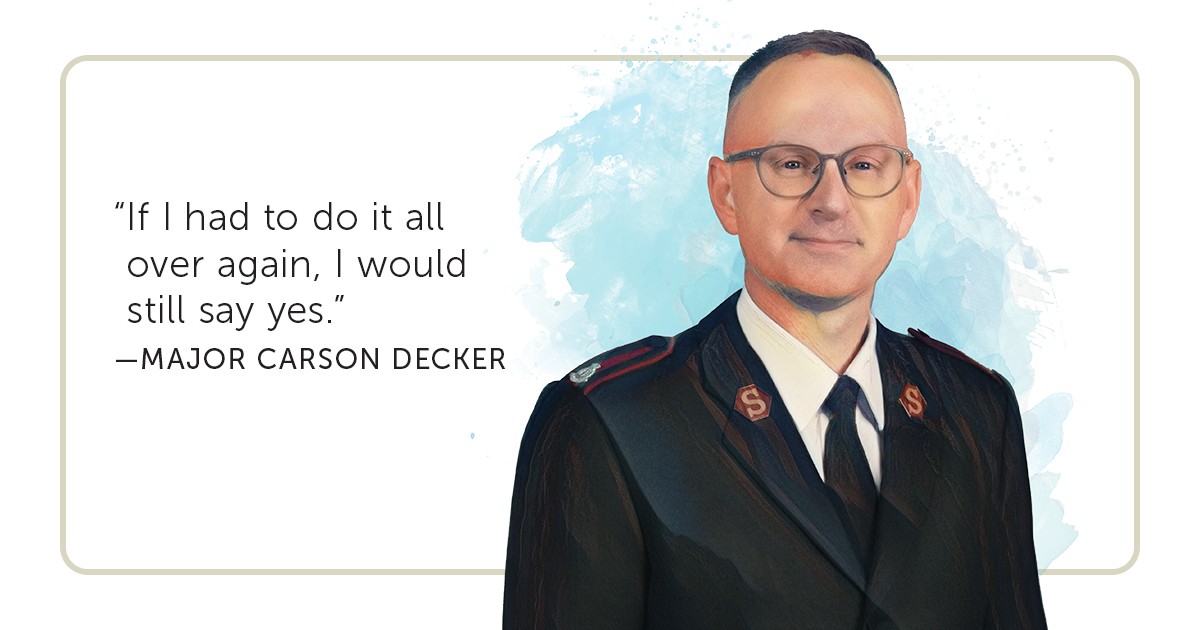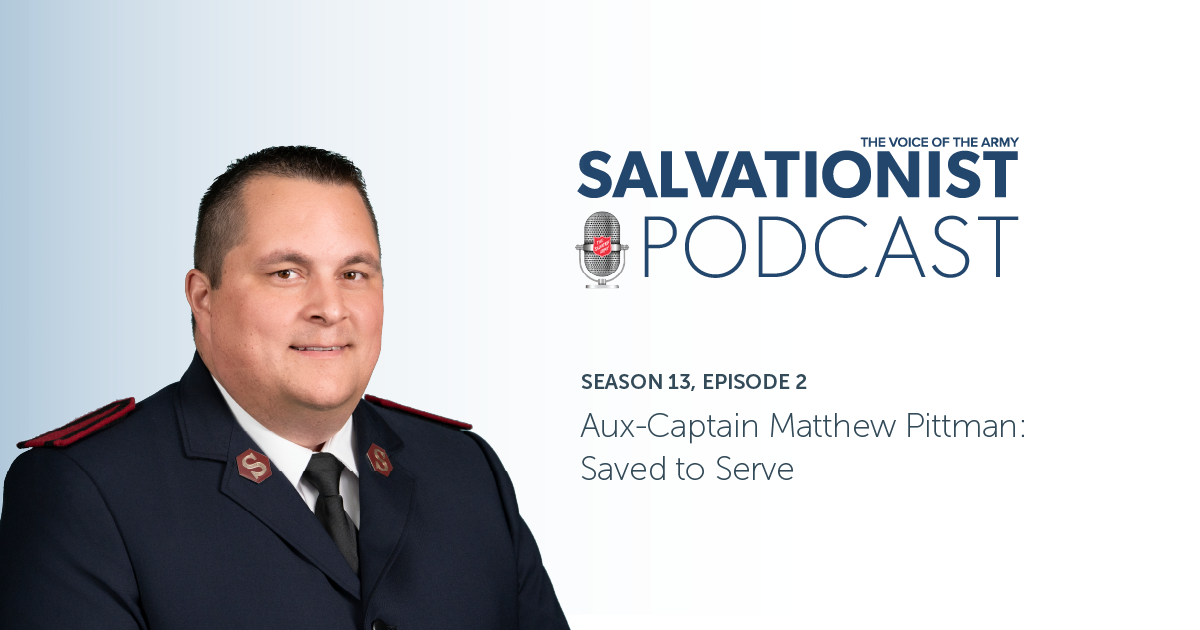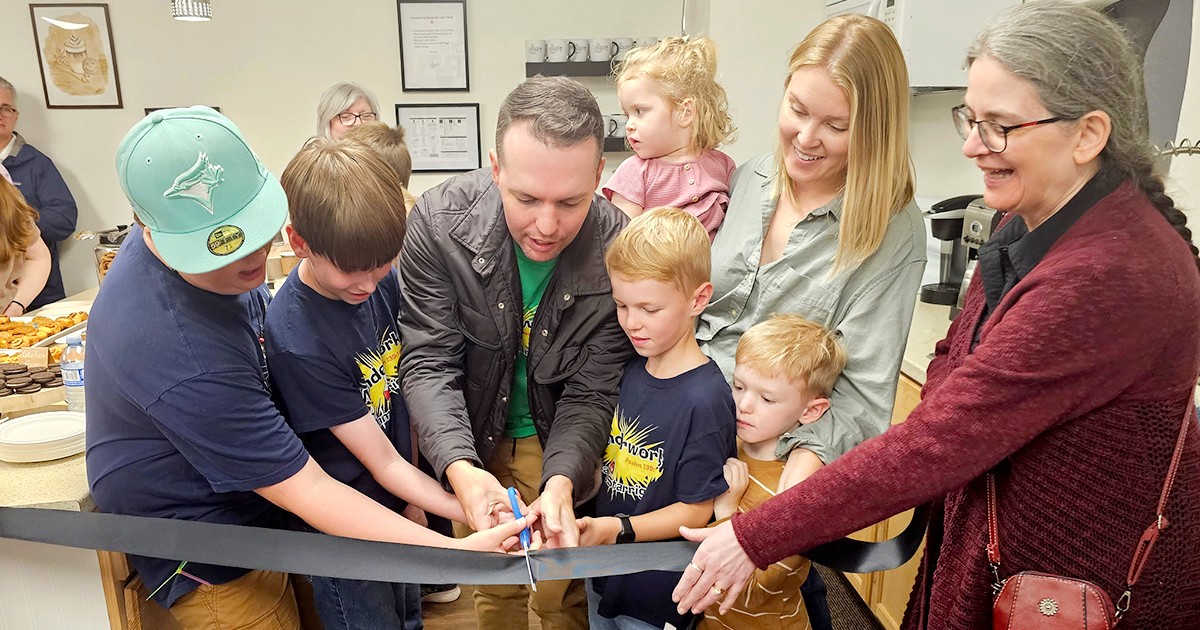Would this person get the same answer if he encountered the gospel in one of our churches? Sure, he might be welcomed at the door, to a pew, even to the mercy seat. He might still accept Jesus as his personal Saviour.
But where could the eunuch go from there? Although we don’t practise water baptism, the question remains: Would he be able to immerse himself in the life of our corps? Would he be invited to play a meaningful role in the future of the church? In outreach? In worship? In leadership?
In some places, the answer to some of those questions might be no, which makes me wonder, What prevents full immersion in our church?
Time and Talents
Growing up, I couldn’t figure out why some of our most talented, creative youth lost interest in our corps’ programming, while I had the time of my life. The answer I got from a leader frustrated me so much that I knew it was true: “There’s nothing here for them.”
One of the easiest ways to increase our program engagement is to diversify the programming itself. In the recent territorial survey for young adults, many expressed gratitude for youth music ministries as foundational to their spiritual lives—mine included.
One respondent envisioned a church where “EVERYONE can participate,” including “less-skilled musicians.” Where are the programs for them? How much kingdom-potential slipped through the gaps we left open because we were focused on programs instead of people? When kids showcased their difference, did we lament or accept that difference and immerse them in new ways?
Just as I Am
A couple of years ago, our senior band did a community engagement with other groups around the city. A tuba player asked if I was with the St. John’s Temple Band. I said yes. He told me that in high school, all he wanted was the chance to play in our band. I asked why he hadn’t.
“A leader told me the young people’s band was the end of the road if I didn’t become a senior soldier, so I figured I should just quit while I was ahead,” he replied. The programs he enjoyed were not meant to nourish him and his soul, but to nourish other programs.
I know what you’re thinking: that’s not what they’re intended to do! But on the individual level, it’s what they have done, and it’s what they are doing.
My home corps just made the decision to welcome band members and songsters regardless of soldiership, so I asked new musicians what it meant to have that barrier removed:
“Being welcomed with such encouragement and open arms made me feel closer to God, and a very strong connection to my church family.”
“It makes me feel as though my church is meeting me where I am, and that I don’t have to be any specific thing to be worthy of their acceptance.”
“As someone with a lifelong church involvement outside the Army, especially in the music of worship, and as someone not quite at the point of joining as a soldier, I greatly appreciate the opportunity to join the songsters and lend my voice to the public worship of God.”
Another set of responses in our survey suggested we consider the “othering” impact of the Salvation Army uniform, and its function as a prerequisite for a certain level of involvement.
Whosoever Will May Come
Overwhelmingly, the young adults of this territory want to belong to a church that is inclusive and accepting of whosoever comes seeking God’s grace. We want a church where everybody belongs, has a voice and plays an authentic role in the body of Christ.
This includes people of different ethnicities, people who are not soldiers and those of different genders and sexual orientation. Everybody. The story of Philip and the Ethiopian eunuch sets the scriptural standard for the radical acceptance of all people into full immersion in the church, the body of Christ. Let’s keep listening and learning on this journey, with humility and love.
Are we ready to become a church that meets this standard, that hears the all-important question and is ready to honestly respond: Nothing is keeping you from full immersion in our church.
Ben Riche attends St. John’s Temple in the Newfoundland and Labrador Division.
llustration: sv_sunny/iStock via Getty Images Plus
This story is from:










Comment
On Sunday, October 10, 2021, Colin Alley said:
On Friday, May 7, 2021, Anon said:
When I went away to university, there was no army to go to. I missed it.
When I came home on Christmas break, my home corps had been closed and my family had transferred to a new corps. I phoned the new band master and asked if I could play with the band while I was home. I was happy when he agreed.
I hadn't had room in my suitcase for my uniform, so I showed up Sunday morning in the only black pants I had and a dark sweater I had borrowed.
I got to the band room early and introduced myself all around, then started to warm up.
When the band master arrived, in front of everyone he chastised me for not being in uniform. Then he made me pack up my horn and leave while everyone watched.
That was over 20 years ago, and I've still never been back to an army band.
On Thursday, April 29, 2021, CJ said:
On Sunday, April 25, 2021, Major Wayne Green said:
On Friday, April 23, 2021, Herb Presley said:
On Friday, April 23, 2021, Jack said:
For example, if a Salvationist is living in a heterosexual Common Law or Cohabit arrangement, they are not eligible to serve as Senior Soldiers until they get married, and thus not allowed to serve the Lord.
In fact, my Fiancee was a Senior Soldier at "The Salvation Army" in at the St. Anthony Corps.
When she tried to get back to signing up as a Senior Soldier, she's not eligible to return as we are living in a heterosexual Cohabiting relationship.
With more couples living Common Law or Cohabiting these days, its important for "The Salvation Army" to change some of their rules to allow couples in these arrangements to serve as a "Senior Soldier", "Auxiliary Lieutenant", or "Auxiliary Captain".
As long as we don't modernize the rules while sticking to the words of the Lord, we will never grow.
On Thursday, April 22, 2021, Debra said:
On Wednesday, April 21, 2021, Erinn said:
On Wednesday, April 21, 2021, Harold said:
Moved to Winnipeg in 2000, went to Booth. I had a great relationship with other students at the college but it was very difficult to belong at a local corps in this city. Maybe it was because the congregation knew we were here for a short time or not. Four years later I moved to Alberta and the same issue. The congregation was very heavily focused on band and choir. I never felt I fitted in and it was very difficult to get to know people at this church. The Christian and Missionary Alliance is very large in Western Canada. A lot of their beliefs are similar to TSA. I got involved in a small group at an Alliance church and 15 years later still friends with this group and been going to this church ever since.
On Wednesday, April 21, 2021, Andrew Francis said:
On Tuesday, April 20, 2021, Old Timer said:
On Tuesday, April 20, 2021, Hurt and Angry said:
On Tuesday, April 20, 2021, Disappointed said:
On Tuesday, April 20, 2021, Capt. Sheldon Bungay said:
Is it pride because we have had success in our past and we want to keep things the way they have always been?
Is it fear because we have no idea what our congregations might look like if we welcome the "other?"
Is it selfishness because we don't want our own comforts disrupted?
Maybe it is confusion because we don't actually fully understand what the Scriptures say!
What I do know is that Jesus was quick to embrace anyone who came humbly seeking, regardless of lifestyle, gender, hurts, habits and hang-ups. As a Salvationist, I want to be known as someone who would do the same. If we are to move forward as a denomination, I pray that we will hear the direction from the Holy Spirit to view every person we encounter with the acknowledgement that they too possess the imago dei within them and may we ever cease to ascribe dehumanizing qualities to them, and instead offer the embrace!
On Tuesday, April 20, 2021, Matt said:
On Tuesday, April 20, 2021, Rob J. said:
On Tuesday, April 20, 2021, Chris said:
So while we may need to address how solidership looks in the future, particularly as we see the placeholders and older generations bent on holding onto Tradition for its own sake continue to not so slowly die off, I think the question needs to be not whether someone’s soldiership gives them a ticket into the band or whatever else, but rather how it can be utilized to bring the Army’s focus back to its God raised purpose. TSA was not raised for “programming” but for mission. And this mission requires soldiers who remain an exclusive group because only those dedicated and willing to sacrifice deserve the title and the honour of being a soldier.
So in the end, arguments over inclusiveness, membership, drinking and participation should only seek to identify and re-define what soldiership itself should look like for those of us left holding up the shattered pieces of our culture and our Army.
I pray that we have a Gideon moment where we are exclusive for the sake of being a mission oriented, effective, and deeply committed Army of God.
On Tuesday, April 20, 2021, A “Young Adult” who is basically middle aged said:
As a “young adult” who is in her mid thirties, this comments section is very disheartening and reminds me exactly why I dislike attending my local corps...it feels extremely elitist, cliquey, I am belittled like a child by church members and told that my thoughts and opinions don’t matter because I’m not a retired officer.
Remember that our founders were radicals in their time, and the traditions they built the Salvation Army upon were to shake things up from the status quo of churches in that time. If we as congregants or leaders refuse to change and cling to these traditions because ‘it’s what we’ve always done’, then how are we any different from the churches that William and Catherine Booth broke free from in the first place?
It’s more important that our communities know we are Christians and Salvationists by our love...not because we have uniforms and shiny instruments and stringent rules for membership.
On Tuesday, April 20, 2021, Jeff Davies said:
On Monday, April 19, 2021, Mary Joy said:
On Monday, April 19, 2021, Glen Smith said:
On Monday, April 19, 2021, Norena Piercey said:
On Monday, April 19, 2021, Nancy Hood said:
On Monday, April 19, 2021, George Kelly said:
On Monday, April 19, 2021, Lynne McDormand said:
On Monday, April 19, 2021, Capt. Nick Samuel said:
On Monday, April 19, 2021, Chris Lyons said:
On Monday, April 19, 2021, Concerned said:
On Monday, April 19, 2021, Timothy McPherson said:
Although I love the Army, I do not see this changing until they love and accept everyone and allow gay soldiers and officers to get married to each other.
On Monday, April 19, 2021, Bill said:
On Monday, April 19, 2021, Jason Locke said:
Here’s the rub: most communities want inclusivity on their own terms. And this often gets couched in the language of spiritual care. But radical welcome can have no agenda other than the Gospel agenda - love for self, love for neighbour and love for God. Everything else needs re-assessing - especially if there’s harm involved.
I think it’s beyond the point now where churches can claim best intentions. Time to take a good hard look at whether we wish to be prophetic or comfortable: I’m not sure we get to have both.
- Jason Locke Minister of Music, Islington United Church Etobicoke, Ontario
On Monday, April 19, 2021, Fred Foster said:
Leave a Comment